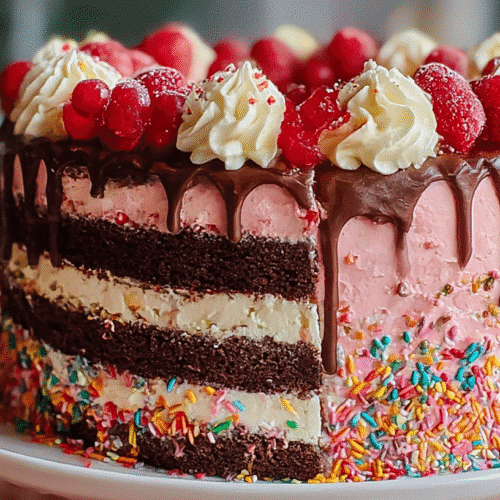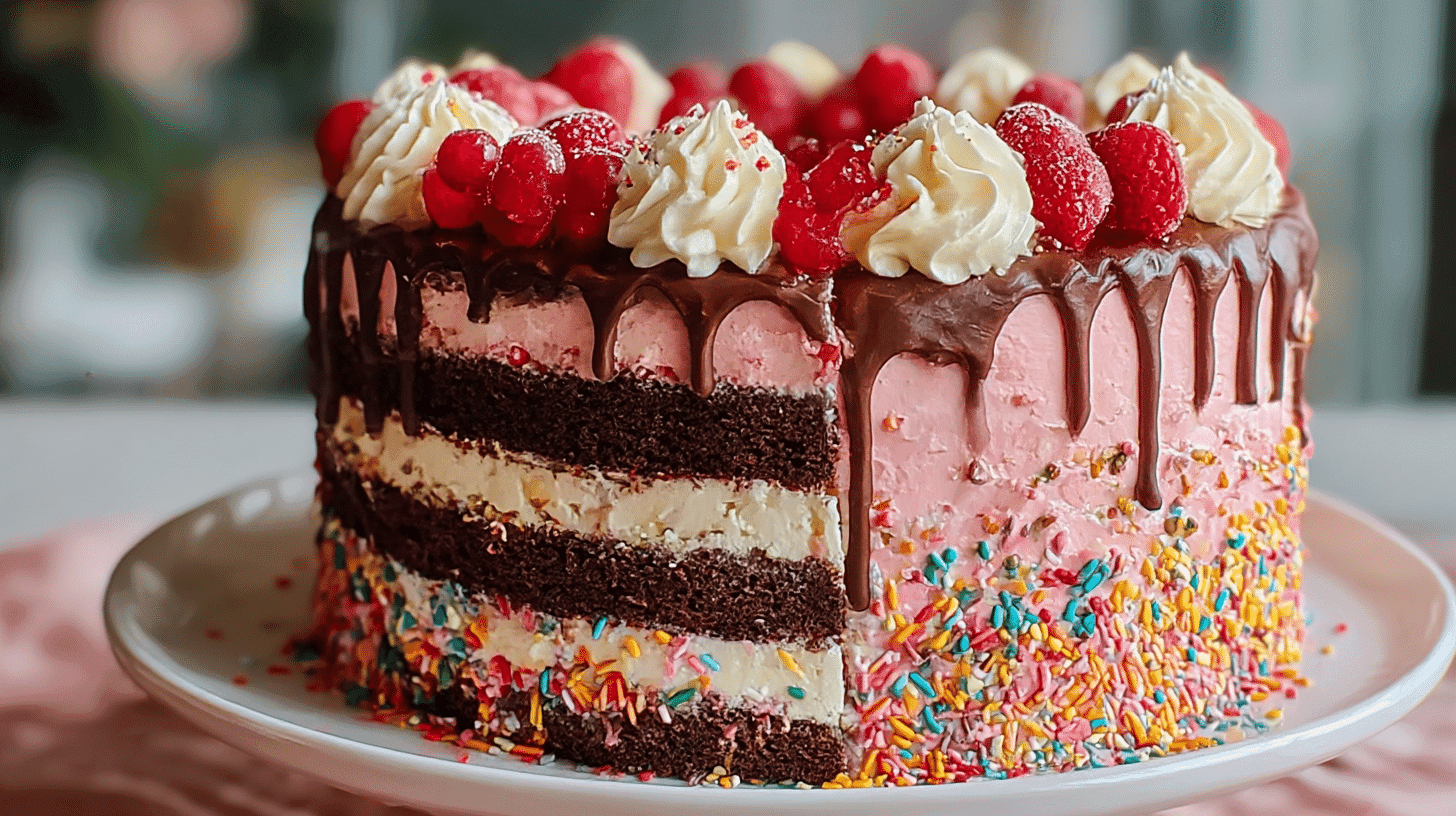Birthday Cake Ideas are more than just recipes—they’re little celebrations wrapped in frosting. Hi, I’m Amanda. Cooking has always been my way of creating comfort, connection, and joy. That’s why I started BeamRecipes—a space filled with simple, approachable recipes for real life. From childhood afternoons baking with my mom to the cakes I now make for my own kids, I’ve learned that food is love made visible. Every recipe here carries a story, whether from tradition or a busy weeknight. My hope is to be your kitchen companion, guiding you toward moments worth remembering with every sweet slice.
Step 1 — Why Birthday Cake Ideas Matter
A centerpiece of celebration
The cake often becomes the first thing people see and the last sweet bite they remember. Having the right birthday cake idea makes the entire celebration feel more personal.
Making memories with flavor
Each slice carries nostalgia — chocolate for comfort, vanilla for warmth, or funfetti for pure happiness. Choosing the right cake flavor is like choosing the memory you want to create.
Creativity sparks delight
A cake can be simple or elaborate, but when it reflects the guest of honor’s personality, it becomes unforgettable. From playful rainbow layers to elegant floral designs, the best cakes tell a story.
Why it always works
Birthday cake ideas work because they blend tradition with surprise. Even the simplest frosted cake, when made with love, feels like a grand gesture.
Ingredients
- 2 cups all-purpose flour, sifted
- 1 cup granulated sugar
- 4 large eggs, room temperature
- 1 cup whole milk
- 1/2 cup unsalted butter, room temperature
- 2 teaspoons baking powder
- 1 teaspoon vanilla extract
- Pinch of salt
Tips with Each Ingredient
- Flour: Always sift to add air and make the cake lighter.
- Sugar: Use fine granulated sugar so it blends smoothly.
- Eggs: Room temperature eggs help the cake rise better.
- Milk: Whole milk adds richness and keeps the cake moist.
- Butter: Soft butter creams better with sugar for a fluffy texture.
- Baking powder: Don’t overmix once added or it loses its effect.
- Vanilla extract: Covers any eggy smell and adds sweet aroma.
- Salt: Just a pinch balances the sweetness perfectly.
Substitutions
Switch vanilla extract with lemon or orange zest for a fresh twist.
Swap all-purpose flour for almond flour or oat flour for a gluten-free option.
Replace whole milk with almond, oat, or coconut milk for dairy-free needs.
Use vegetable oil or dairy-free margarine instead of butter.
How to Make It (Expanded Instructions)
- Preheat and prepare pans
Set your oven to 350°F (175°C) and grease two 8-inch round cake pans. Line the bottoms with parchment paper for extra insurance against sticking. This simple step saves you from the heartbreak of a cake that won’t release. - Mix dry ingredients
In a medium bowl, whisk together flour, baking powder, and salt. Whisking does more than combine — it aerates the flour so your batter stays light. - Cream butter and sugar
In a large bowl, beat butter and sugar with an electric mixer on medium speed for 3–5 minutes, until pale and fluffy. This process traps air in the fat, which will later expand in the oven and give your cake that tender, soft crumb. - Add eggs and flavoring
Crack in one egg at a time, mixing well after each addition. This keeps the batter stable and prevents curdling. Stir in vanilla extract (or almond if you prefer a different note). - Alternate wet and dry
Add one-third of the flour mixture, then half of the milk, repeating until all are added. Begin and end with flour. This method helps maintain structure while keeping the batter smooth and lump-free. - Bake with care
Divide batter evenly between pans and smooth the tops. Bake for 25–30 minutes, checking at 25. Cakes are ready when a toothpick comes out clean and the tops spring back to the touch. Rotate pans halfway through if your oven has hot spots. - Cool completely
Let cakes rest in pans for 10 minutes before turning them onto a wire rack. Cooling fully prevents the frosting from sliding off or melting into crumbs. - Frost and decorate
Spread a thin “crumb coat” of frosting first to trap loose crumbs, chill briefly, then finish with a thicker, smooth layer. From buttercream swirls to fun sprinkles, this step is where personality shines.
Why These Ideas Work (Expanded)
Butter and sugar magic
Creaming builds tiny air pockets that expand in the oven, giving the cake its tender texture. Skipping or rushing this step often leads to a dense, heavy cake.
Eggs provide structure
Eggs act like glue — the proteins set during baking, helping the cake hold its shape. They also add richness and a golden color.
Baking powder lifts
Without it, the cake would be flat. Baking powder releases carbon dioxide bubbles when heated, which pushes the batter upward for that soft, fluffy crumb.
Frosting seals in moisture
Frosting isn’t just about looks — it locks in moisture so the cake stays fresh longer. A good layer of buttercream or whipped cream creates both protection and indulgence.
Decoration as personalization
This is where creativity comes alive. Fresh flowers for elegance, rainbow sprinkles for playfulness, or fondant shapes for themed parties — decoration turns a simple cake into a celebration centerpiece.
Step 5 — Real-Life Variations (Expanded)
The rainbow layer cake
This cake is pure joy for little ones (and even adults who love fun). Bake six thin layers, each tinted with food coloring. Stack them with vanilla buttercream between each layer for a magical reveal when sliced. It’s a showstopper at kids’ birthdays and perfect for a big “wow” moment.
Chocolate overload cake
If you’re baking for a chocolate lover, this is the dream. A rich sponge layered with silky ganache, then crowned with chocolate bars, truffles, or cookies. It’s indulgent, messy in the best way, and always a crowd favorite.
Fresh fruit-topped cake
When you want something lighter and refreshing, this variation shines. A fluffy vanilla or sponge base, topped with whipped cream and seasonal berries, feels elegant yet simple. Perfect for spring or summer birthdays.
Ice cream cake
This one’s beloved for warm-weather birthdays. Layer softened ice cream between cake rounds, then refreeze before frosting with whipped cream. It’s playful, customizable with favorite flavors, and a nostalgic favorite for many.
Minimalist naked cake
The rustic beauty of this cake lies in its simplicity. Thin layers of frosting allow the cake layers to peek through, giving it an elegant, understated look. Add fresh flowers, herbs, or fruit on top for a naturally chic style that works for adult birthdays.
Common Mistakes to Avoid (Expanded)
Overmixing batter
Mixing too long develops the gluten in flour, leaving your cake dense and chewy instead of tender. Stop as soon as everything is combined.
Uneven baking
Every oven has hot spots. Rotating pans halfway through ensures even rising and avoids cakes that are lopsided or dry on one side.
Frosting a warm cake
It’s tempting to frost immediately, but warm cake melts frosting, creating a sloppy mess. Cooling completely (or even chilling briefly) makes frosting smooth and easy.
Using cold butter
Butter that’s too firm won’t cream well with sugar, leaving lumps. Soft, room-temperature butter blends smoothly and creates the air pockets you need for a fluffy cake.
Skipping parchment paper
Even a well-greased pan can stick. A parchment-lined base guarantees your cake releases perfectly every time — no broken layers.
FAQ (Expanded)
❓ What is the easiest birthday cake to make?
A one-bowl chocolate cake is nearly foolproof. You mix wet and dry in the same bowl, bake, and frost — minimal effort with maximum payoff.
❓ How far in advance can I bake a cake?
Cakes can be baked 1–2 days in advance. Keep them tightly wrapped at room temperature or refrigerate if frosted with cream-based toppings.
❓ How do I keep a cake moist?
Wrap warm layers in plastic wrap and let them rest before frosting. This locks in steam and keeps them tender. A simple syrup brushed between layers also helps.
❓ Can I freeze a birthday cake?
Yes! Wrap unfrosted cakes in two layers of plastic and freeze up to one month. Thaw overnight in the fridge before decorating.
❓ What’s the best frosting for kids’ cakes?
Buttercream is the winner: easy to spread, holds color well, and perfect for sprinkles, candies, or piped decorations. Whipped cream works too but is less stable.
Final Encouragement
Your birthday cake doesn’t need to be perfect — it just needs to be made with heart. The laughter when the candles are blown out, the frosting smudges on happy faces, the joy of sharing a slice together — that’s the real recipe. Bake with love, and every cake becomes the best cake.

Birthday Cake Ideas
Equipment
- Two 8-inch Round Cake Pans
- Mixing Bowls
- Electric Mixer
- Whisk
- Parchment Paper
- Spatula
Ingredients
Cake Ingredients
- 2 cups all-purpose flour sifted
- 1 cup granulated sugar
- 4 large eggs room temperature
- 1 cup whole milk
- 0.5 cup unsalted butter room temperature
- 2 tsp baking powder
- 1 tsp vanilla extract
- 1 pinch salt
Instructions
- Preheat oven to 350°F (175°C). Grease and line two 8-inch cake pans with parchment paper.
- In a medium bowl, whisk together flour, baking powder, and salt.
- In a large bowl, beat butter and sugar until light and fluffy, 3–5 minutes.
- Add eggs one at a time, mixing well after each. Stir in vanilla extract.
- Alternate adding flour mixture and milk, beginning and ending with flour. Mix gently until just combined.
- Divide batter between pans and smooth tops. Bake 25–30 minutes, or until a toothpick comes out clean.
- Cool cakes in pans 10 minutes, then transfer to wire racks to cool completely before frosting.
- Frost with buttercream, whipped cream, or frosting of choice. Decorate simply with sprinkles, fruit, or themed toppers.

